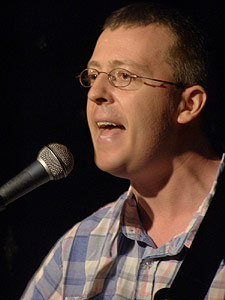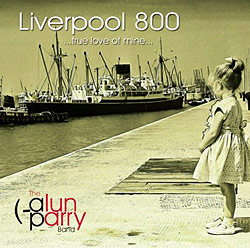
| HOME |
| NERVE |
| REVIEWS |
| ARCHIVE |
| EVENTS |
| LINKS |
| ABOUT US |
| CONTRIBUTORS |
| BACK ISSUES |
| CONTACT US |
6/12/2007
 Interview
with Alun Parry
Interview
with Alun Parry
Alun Parry is acknowledged as one of Liverpool’s leading acoustic based performers and songwriters. His albums Corridors of Stone and Liverpool 800 and his work to promote live music have received widespread critical acclaim. In this abridged version of a recent interview Parry speaks about the values that underpin his work.
‘True Love of Mine.’
The title song on your latest album is a passionate
love song to the city. What does it mean to love Liverpool?
My association with Liverpool was doubly assured: I was born here and
named after a Liverpool centre-forward called Alun Evans. It feels like
home; I can only go on holiday for four days and I want to be tethered
back to here. Things don’t feel atomised here – there’s
a village feel about it. It’s simple – it feels like a good
place to be and I like the sense of solidarity. Liverpool people have
long been associated with this – we help one another out; we stick
together; we’re politically bloody-minded. In the Thatcherite mid
Eighties - a time of economic disaster for the city - Liverpool and Everton
were playing in the F.A. Cup Final at Wembley. But it was the call of
‘Merseyside’ that went round the stadium. Any partisan feelings
about individual teams were subsumed in the defiant roar of being from
Liverpool. I remember this ambassadorial imperative from a very early
age. Family holidays were taken in Blackpool. ‘Behave. You’re
not in Liverpool but you’re from Liverpool,’ my mother would
say. I’m proud of Liverpool because my heart and the heart of the
city seem to beat to the same rhythm. I have a strong value system and
a certain positivity in adversity, which I feel Liverpool broadly shares.
At the same time I would want to distance myself from ideas of superiority
or a sense of ‘nationalism’ about the city. The grotesqueness
of self superiority, coupled with the idea that birthplace and ‘heritage’
as the issue of overwhelming importance, is a credo I find revulsion for.
‘Read the buildings and you’ll see.’
With the recent opening of the new Liverpool
International Slavery Museum in the year that marks the 200th anniversary
of the abolition of slavery there has been a lot of publicity about this
part of Liverpool’s history and one of the songs on the new CD addresses
the issue. How do Liverpool people in general deal with this?
Eric Lynch, a black man in his seventies does tours of the waterfront.
I didn’t know 95% of what he told me about slavery. ‘Read
the building and you’ll see,’ he says. When you look at the
carvings glorifying the slave trade on the buildings in Liverpool and
Bristol you start to understand the economic mindset that perpetrated
this terrible trade. I am ashamed - but I don’t know if I’d
necessarily use that word for everyone else. I would say most people don’t
think about it too specifically. That’s why Eric’s tours and
the Slavery Museum are important: they keep the issue visible. Some people
want the ‘grotesque’ carvings of slaves manacled removed.
I don’t agree with this; people need to see these ideas.
‘For I see a world that is owned by the few.’
Some of your songs have a strong political
content, dealing as they do with the work conditions of ordinary working
people [My Granddad was a Docker] and more contemporary issues of immigration
and asylum seeking [I Want Rosa to Stay]. To what extent do you walk your
talk?
I would call myself extra-parliamentary. I believe the biggest power we
have is social power. Changing things is a ponderous parliamentary process;
there are simpler, more direct means. When the issue of BNP flyers being
delivered with the post arose there was a call to change the law but all
that was needed was for the postal workers to refuse to deliver them.
I believe in the power of ordinary people to affect change. I don’t
believe this in a romantic sense; I ‘m speaking practicalities.
This belief is a recurring theme in my work, my music, my politics, and
my approach to DIY music. There’s a long history of working class
toil in Liverpool and the song about my granddad celebrates that. People
like him built the city just as surely as anybody else did.
I don’t just sing about political issues. The Labour government
began imprisoning asylum seekers in my local prison: HMP Walton. I founded,
with some colleagues, an action group called Merseyside Against Detention
which campaigned against this: holding several demos at the prison; getting
a double page spread in the Liverpool Echo; and ensuring it was the front
page story in the Independent on Sunday. In addition, we went to the prison
regularly and campaigned on behalf of the detainees. This is some of the
background to my motivation for writing I Want Rosa to Stay. The song
celebrates those positive attributes that immigrants have to offer at
the same time that it challenges the dodgy economic arguments against
their presence and the cynical deflection of attention away from the inadequacies
of the status quo onto a scapegoat.
I’m always happy to play for free for any cause I broadly agree
with.
‘Don’t just sign the petition.’
I notice from your blogs and the article you
did for The Big Issue that you have a direct, concise, journalistic style.
I have some tenuous connection with political journalism in that I used
to work as a volunteer on Labournet, a site that arose as a result of
the dockers’ dispute that went on for nearly two years. We used
the net to disseminate information on a global scale: looking at media
coverage from a worker’s point of view. It was the sort of stuff
that doesn’t otherwise get an airing and it was immediate –
the photos and reports were all up there the same day. It was bottom-up
reporting - ordinary people telling their stories without relying on Murdoch
or the BBC.
 ‘The
listener decides.’
‘The
listener decides.’
It appears you have some radical views with
regard to the economics of the music business.
I’ve applied the busking philosophy to my present circumstances.
My albums are conventionally available in the shops with a price marked
on them but on my site I’m making my music freely available, just
as I did on Bold Street. There is still an option to put money into my
‘busker’s hat’ – the purchaser decides how much.
It’s revolutionary – it goes against the trend of trying to
sue kids for downloading music off the internet.
I’ve never understood why, if I’m bringing in a load of fans
to listen to my music and spend money over the bar I’m also expected
to pay a lot of money to hire a room that would otherwise be empty. I
don’t mind paying for a good P.A. and an in-house engineer; but
if I’m providing the P.A. and the engineer and doing the promotion
and booking the support bands and bringing in lots of trade for their
bars I don’t see why I should be charged. I hope to encourage a
self-reliant method of getting gigs, showing, for example, where musicians
can stage their own gigs without unfair room hire charges. I’m also
encouraging people to let me know which venues actually pay something
for the services of musicians even if it’s only a percentage of
the bar tab to keep it risk free for them.
My campaign to highlight music friendly venues has the support of Echo
music writer Jade Wright who is publicising it on her blog. Information
will be collated and there will be a free on-line directory of such venues.
You’ve talked about DIY music promotion.
How did you develop it?
You can’t get much more DIY than my musical origins - I wrote songs
as a kid then became a busker using my uncle’s classical guitar.
I like to have power over where I play; I look out for music friendly
venues; I like to negotiate the deals personally; I like to select the
support acts carefully. If I have this control I get a better deal and
the people I perform with benefit as well. My aim is to fill a room with
an audience (whom I don’t charge) and a stage with good musicians.
I also want to be performing my own music. I actually love being in a
band. The band is not a traditional ‘lets find our sound band.’
I have my sound from my days as a solo artist. I now want people to add
to that sound rather than create a new one so I write all the songs.
What’s happening now?
My latest venture is to try to set up a similar arrangement in other cities
and towns. I’ve taken Manchester, Preston, Liverpool, Birmingham,
Derby and Leeds and the idea is to do an acoustic night in each of these
once every two months at which my band would perform. In addition I would
search the internet for three acts local to the area I’m in. They
have to be acts I like; I’m a big believer in quality control so
I never just go on recommendations. I’m also very careful about
venues; I don’t want someone’s night out parking itself at
my event!
For the full version of this interview and more information about Alun
Parry please visit www.parrysongs.co.uk
Click here to read Sandra's review of Liverpool
800: True Love Of Mine